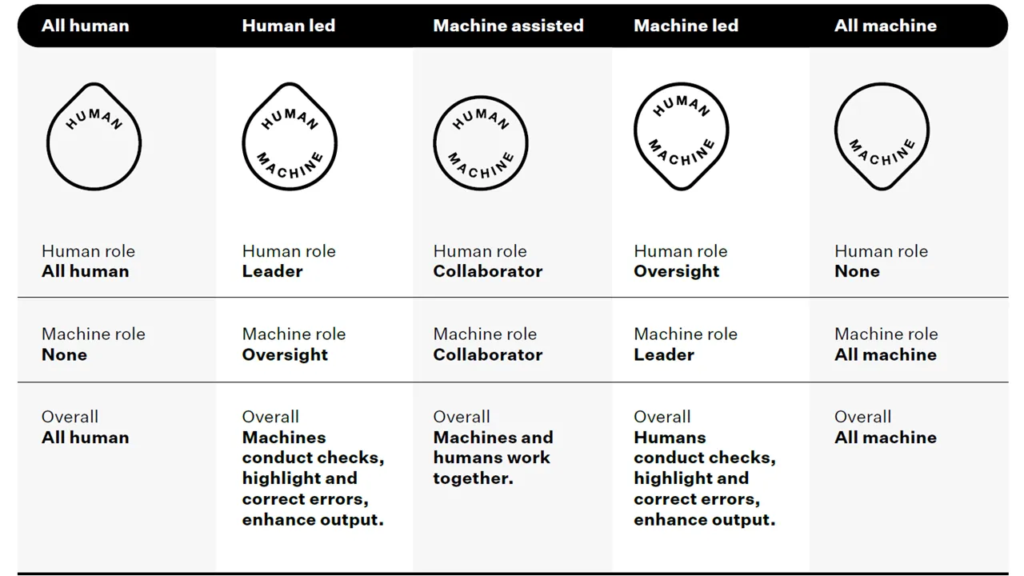Dubai has taken a major step in reshaping how knowledge is created and consumed by launching a first-of-its-kind Human–Machine Collaboration System. Spearheaded by Sheikh Hamdan bin Mohammed bin Rashid Al Maktoum, Crown Prince of Dubai and Chairman of the Dubai Future Foundation, the initiative aims to bring a new level of clarity to the rapidly evolving world of content production and scientific research.
With AI tools becoming more common across academic writing, media, design, and data interpretation, the need for transparency around their use has never been more relevant. The newly introduced system tackles this challenge by visually communicating the extent to which intelligent machines contributed to any given piece of work.
Clear visual indicators to build trust in content

Developed by the Dubai Future Foundation, the classification system uses a set of five key icons to represent different levels of collaboration between humans and machines. These range from “All Human” content with no AI involvement to “All Machine” outputs created entirely by automated systems.
There’s also a middle ground, covering scenarios where AI assisted in tasks like translation, data processing, or quality improvement, while the core ideas or structure were still human-driven.
To provide even deeper context, nine function-specific icons indicate the stage at which human-machine collaboration occurred—be it during ideation, data collection, writing, visuals, or analysis.
This framework has been designed to apply across various industries and content formats, ensuring that its use can be adapted to academic journals, editorial media, marketing content, and even government documents.
Government-wide rollout and global invitation
Sheikh Hamdan has officially instructed all government entities in Dubai to adopt the new classification system, embedding transparency into public sector research, communication, and content delivery. His call also extended beyond the UAE, encouraging publishers, researchers, educators, and content creators around the world to begin using the icons in their work.What does trust look like in the age of #AI?
— Dubai Future Foundation (@DubaiFuture) July 16, 2025
As machine and human intelligence become harder to tell apart, authorship becomes harder to trace.
To support transparency, we’ve launched the ‘Human–Machine Collaboration icons’ (HMC), a visual system that makes AI involvement in… pic.twitter.com/J2xwzIDcVm
“Artificial intelligence has made enormous strides, but with this advancement comes the responsibility to be clear about its role in our creative and academic processes,” he noted during the system’s launch.
The classification system doesn't attempt to rank or score the degree of machine involvement with numerical percentages. Instead, it gives content creators the flexibility to disclose this information based on professional judgment—while still making it easier for readers and institutions to interpret the integrity of what they’re consuming.
A forward-thinking move for content creators and publishers
Across industries, the new Human–Machine Collaboration System is expected to be a game-changer. From editors in publishing houses to data scientists, visual designers, and marketing teams, professionals now have a structured way to declare the level of AI support behind their work—without compromising credibility.
By incorporating these icons, organisations can provide readers and stakeholders with greater clarity, build trust in machine-assisted content, and stay ahead of evolving regulatory expectations around ethical AI use.
In publishing, for instance, this could reshape how academic papers, reports, and digital media are presented. Readers will be able to immediately see whether the work was generated solely by humans or with AI support. For educators and researchers, this creates a more honest framework around how knowledge is created and interpreted.
Reinforcing Dubai’s leadership in ethical AI
This classification initiative fits neatly into Dubai’s broader strategy of becoming a global capital for responsible AI adoption and digital innovation. While many countries are still debating how to regulate AI-generated content, Dubai is taking a proactive stance by providing not just policy, but a working tool that can be implemented right away.
It’s a move that reflects Dubai’s commitment to transparency, innovation, and global collaboration, as well as its determination to lead conversations around future technologies rather than react to them.
As the first city globally to launch such a system, Dubai offers a roadmap that could soon be replicated in other tech-forward regions looking to balance innovation with integrity.
What creators and institutions need to do next
The classification system is available as a downloadable toolkit for public and private sector organisations interested in adopting the framework. It includes the icon pack, usage guidelines, and sector-specific examples.
While its use is currently mandatory only for Dubai Government departments, creators in media, education, and the private sector are strongly encouraged to adopt the system voluntarily. Doing so not only positions them at the forefront of ethical content practices but also aligns them with international standards that may soon become the norm.
Those interested in exploring the toolkit can access it through the Dubai Future Foundation’s official portal.
A smarter, clearer path forward
With the global rise of AI in creative and academic spaces, questions around ownership, accuracy, and transparency are becoming increasingly urgent. The launch of Dubai’s Human–Machine Collaboration System addresses these concerns head-on, offering a well-structured and practical way to clarify the role of intelligent machines in content production.
Across sectors, it fosters honesty, standards, and human–AI synergy.
Read More:
- Dubai student & teacher parking now just Dh100/month with Parkin - Social Kandura
- Stereophonics to Headline Coca-Cola Arena Dubai This October - Social Kandura
For more updates on Dubai’s innovation efforts, AI developments, and smart government strategies, follow Social Kandura and stay in the loop with what’s shaping the UAE’s future











